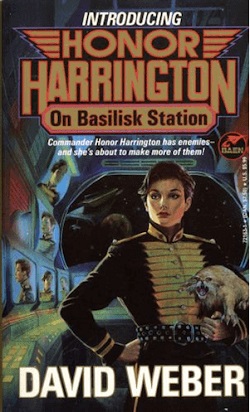Having made him look a fool, she's been exiled to Basilisk Station in disgrace and set up for ruin by a superior who hates her.
Her demoralized crew blames her for their ship's humiliating posting to an out-of-the-way picket station.
The aborigines of the system's only habitable planet are smoking homicide-inducing hallucinogens.
Parliament isn't sure it wants to keep the place; the major local industry is smuggling; the merchant cartels want her head; the star-conquering, so-called "Republic" of Haven is Up To Something; and Honor Harrington has a single, over-age light cruiser with an armament that doesn't work to police the entire star system.
But the people out to get her have made one mistake. They've made her mad."
I've long wanted to read David Weber's 'Honor Series'; it's ubiquity in some form or another in charity shops points to a wide fanbase, but until recently I never found a copy of the first in the series, 'On Basilik Station'. It was well worth the wait, and I'm very keen to read the next book.
The Baen business model is fascinating, and their commitment to freeshare books is one that's exceptional in its fairness and earned scruples. The first half dozen books in the series are currently available online to read for free, or to download to Kindle for a pittance. It allows new readers to get into the series easily, and the accessibility encourages hooked readers to continue reading by picking up a full price book.
This is an excellent idea, and for a series that is currently pushing 15 books, an easy way to entice readers into commiting to a series without breaking their bank account. It also allows for Bain to see the interest levels in their stories.
It helps that the books are fantastic, a roaring alternative to Sharpe or Hornblower set in the far future, but with a tactical and military side that does a far better job of recognizing the range and scale of space conflict than almost any other book I've read, aside from maybe Iain M Banks' Culture novels.
Honor herself is a wonderful character, a strong female protagonist with a novel back story and charisma, charm and chutzpah in spades. The villains are unsubtley written, as is the case for almost all books of this style, but that's part of the fun - and fun it is, to an almost ridiculous degree.
Also Try:
David Weber, On Basilisk Station - http://www.baenebooks.com/p-304-on-basilisk-station.aspx
Iain M. Banks, Player of Games
Orson Scott Card, Ender's Game





